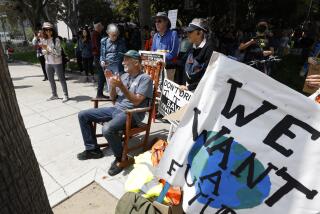Showdown at Global Warming Summit
KYOTO, Japan — While government officials debate the future of the planet behind closed doors here at the global warming conference, another wrangle is occurring on the floor of the conference center in a place known as the Smoke Pit.
Crouching next to a knot of officials shrouded in cigarette smoke, whispering strategies behind a cupped hand, is the man who critics say has the desire and the power to cause negotiations here to fail to produce an international accord.
Meet Daniel Pearlman, a U.S. lobbyist for oil, gas and power interests. He has been dubbed “the high priest of the carbon club” and is as respected by his critics for his encyclopedic knowledge of international and environmental law as he is reviled for the way he uses what he knows.
A portly chain-smoker with as many drooping chins as a basset hound, the secretive Pearlman will not name his clients, does not give interviews and has only rarely had his picture published--once, years ago, when he was photographed with a robed Kuwaiti sheik who was trying to block the camera; the other time, last week, when a paparazzo environmentalist snapped him and printed the result in a newsletter with a caption referring to the jowly cartoon character Deputy Dawg.
Keeping a close eye on Pearlman here, with one hand on a cellular telephone and the other clutching a draft agreement, is Bill Hare. He is a reedy Australian physicist who is now a director of Greenpeace. As much as Pearlman is protected by shadows, Hare and his confrontational nonprofit environmental group are sustained by the limelight.
The chess game between these opposing advocates may have, in its own way, almost as much to do with the outcome of the Kyoto conference as the officials who sign any deal.
The agreement due to be signed Wednesday would force developed countries to reduce emissions from burning fuels. These emissions, scientists say, trap the Earth’s heat like a greenhouse roof and potentially cause: the melting of polar icecaps; extreme weather such as droughts and flooding; and the spread of tropical diseases. At stake in Kyoto this week are the way countries create and use energy; thousands of jobs; the state of nations’ economies; and the living environment of billions of people.
Most of those who came to Kyoto believe that global warming is a real problem that must be confronted.
But some parties, including nations that produce oil and the companies that sell it--among them Pearlman’s clients--believe that the negotiating time here will be too short, the stakes too high and the scientific basis too sketchy for a meaningful agreement.
A group of energy companies, the Global Climate Coalition, has urged President Clinton not to OK signing a treaty here and has helped persuade Congress to reject any agreement that does not make developing countries cut their emissions too.
*
A senior U.S. official has called the Kyoto conference “the single most important environmental and economic negotiation we’ve ever undertaken.”
As a result, more than 800 registered lobbyists are here, and many have been vigorously working this issue for years in their trademark ways, sometimes to the annoyance of conference officials.
At a previous convention, Greenpeace staged a protest in the meeting hall and was ejected.
Pearlman, though, prefers to work closely and quietly with clients and colleagues in official meetings, and has even written proposed amendments for the Kuwaiti delegation.
But he too has been ousted from sessions. And because of lobbyists’ intense involvement in past meetings on this topic, sessions at the Kyoto conference are closed to all but government officials.
“He has tremendous influence,” Sathiah Renji, head of Malaysia’s delegation, said of Pearlman. “And countries depend on him. I’ve seen fossil-fuel producers consult with him before making a decision.”
Renji recounted an incident when a Middle Eastern delegate asked to delay a vote at a closed meeting while he went to the bathroom; the chair sent an escort along and found Pearlman waiting outside.
Renji terms Pearlman and his ilk clever but dangerous. “They don’t want to see any progress here,” he said of the anti-treaty lobbyists. “They don’t want an agreement.”
What Pearlman wants is what is best for his clients, and he will do what is necessary to protect their interests.
Because his clients have common interests with only a tiny minority of the 166 nations here, one strategy is to subtly stall proceedings to burn up time.
For two years, for example, the Organization of Petroleum Exporting Countries has blocked adoption of rules on the number of votes needed for a final accord to be reached here--a maneuver observers say has Pearlman’s fingerprints all over it. He refuses to confirm whether he is a formal advisor to OPEC. But Pearlman often “exchanges views” with its representatives, said Mohammed Alipour-Jeddi, OPEC manager of international relations.
(Pearlman agreed to an interview for this article but declined to be quoted in any way.)
Thomas Kirlin of the American Petroleum Institute dismisses critics, saying: “They’re uncomfortable that Dan Pearlman knows a lot about the issues, the process and the parties. There’s a lot of ludicrous scapegoating that goes on here.”
*
Hare and the network of other powerful environmental groups--including the World Wildlife Fund, the Climate Action Network and Friends of the Earth--have influence in their own right. Pearlman is just one of their concerns. But he is a real one.
“One of our main strategies is to keep delegates intellectually honest, to separate politics from facts,” Hare said.
He contends that Exxon Chairman Lee R. Raymond, for example, recently told an audience in Beijing that global warming is a myth and that oil is the lifeblood of economic growth. “Then he turns around and says that the [oil and gas] industry can’t accept the Kyoto agreement because developing countries like China aren’t doing enough to limit their emissions,” said Hare. “It’s spectacular hypocrisy.”
For Hare and his peers, part of the challenge is being creative and effective with little or no money. The cost of a recent, influential $13-million advertising campaign sponsored by the Global Climate Coalition equaled Greenpeace’s entire annual budget. That means that Hare and his colleagues must rely, instead, on attention-getting, confrontational acts to make their point--ramming oil tankers and whalers, conducting noisy protests and hanging banners on smokestacks.
In Kyoto, the message has been more playful: Greenpeace has been serving coffee and eggs prepared with heat from solar panels; on Friday, the group unveiled a “carbonosaurus” dinosaur made of oil cans and old engines.
But, Hare said: “I think our influence has been mostly outside this meeting [rather] than in it. The public believes there is a global warming problem, and that allows the negotiations to occur. [Environmental groups] have helped make the issues prominent here,” and they believe their key battle may lie ahead, in getting lawmakers, such as those in Congress, to ratify any Kyoto accord.
Hare makes a quick call on his cell phone, checks his watch and starts across the conference hall for yet another strategy session on the science of influence.
“I guess I am a lobbyist,” he says with a grin. “But I always think of myself as a physicist.”
More to Read
Sign up for Essential California
The most important California stories and recommendations in your inbox every morning.
You may occasionally receive promotional content from the Los Angeles Times.










